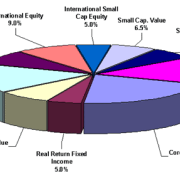UNDERSTAND THE MAKEUP OF YOUR PORTFOLIO
When new prospects come to me to look over their investments, more often than not they have absolutely no idea what they are investing in, with which firm and how much they are paying in fees.
Global financial markets have been in the doldrums for months. No one likes to lose money, but there is a silver lining to the drop. Clients have started to take more of an interest in the securities they own.
When new prospects come to me to look over their investments, more often than not they have absolutely no idea what they are investing in, with which firm and how much they are paying in fees. In addition, investors typically have no idea how aggressively or conservatively their money is being invested.
Mistaken
As a financial adviser, I have often come across clients who think they really understand what they own and how conservative their investments are. Upon reviewing their statements, we often find a vast difference between what the client thinks he has and the facts on the ground. For example, a client may say he is “a risk-free investor with a conservative portfolio.” Then we find his portfolio is solely invested in stocks, and during the course of the year this portfolio has moved up and down by over 20 percent.
Recently I sat with someone who has a very sizable account and a very sizable position in Apple stock. He was telling me how his portfolio was very conservative, and he only lost about 2% over the last 10 months. I said he was most probably incorrect and that with such a huge position in Apple – which up to that point had dropped nearly 30% over this time period – he lost significantly more than he thought.
Who is responsible? Financial advisers certainly need to explain investments to their clients – all the risks, how each investment works, etc. But the ultimate responsibility lies with the client. It is always worthwhile taking the time to understand where your money is being invested, and you should always ask questions until you are totally clear about what you are investing in.
Plan ahead
Before you meet with your investment professional, organize your goals. For example, how much income is needed to supplement current National Insurance Institute payments, Social Security or any other pension fund to meet your fixed expenses? Do you have children or grandchildren to marry off? Are your elderly parents in need of care? You must determine your own budget needs and your ability to tolerate risk first. Then ask your adviser what kinds of investments would best fulfill these goals. Use your adviser as a sounding board. He can tell you if your goals are realistic. If not, you can work together to come up with goals that can be achieved.
Clarity
When it comes to making decisions, focus on the whole range of the investment’s characteristics rather than simply on hopes of a high return. It is necessary to understand the cost, degree and nature of the risks, investment goals, performance history and any special fees associated with an investment before you decide to purchase it.
One also should never assume that an investment is federally insured, low risk or guaranteed to deliver a certain return. Find out all the necessary information – and then make sure you understand it properly. Then you can check it against your own goals and risk profile to see if the recommended type of investment is a good fit.
Continued cooperation with your financial adviser will only help you in your efforts to make sure your investments remain consistent with your goals. Periodically reviewing your portfolio with him is a good way to assess whether it is still consistent with your needs. On the same note, make sure your investment strategy remains current. If there is a change in your financial situation, consider whether your strategy needs to be reevaluated.
Remember: Ignorance isn’t bliss. Know what investments you have and why you have them.
This article originally appeared in The Jerusalem Post.
Aaron Katsman is a licensed financial professional in Israel and the United States who helps people with US investment accounts. He is the author of the book Retirement GPS: How to Navigate Your Way to A Secure Financial Future with Global Investing.
You can contact Aaron with your questions at: aaron@lighthousecapital.co.il
And don’t miss his weekly podcast.










